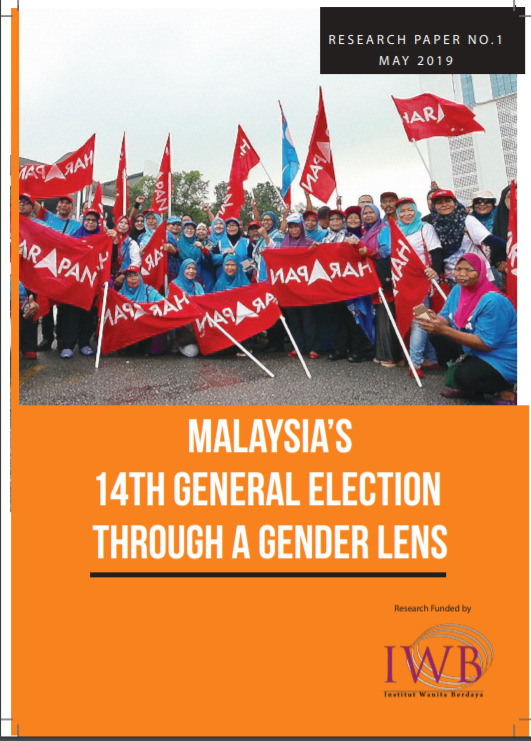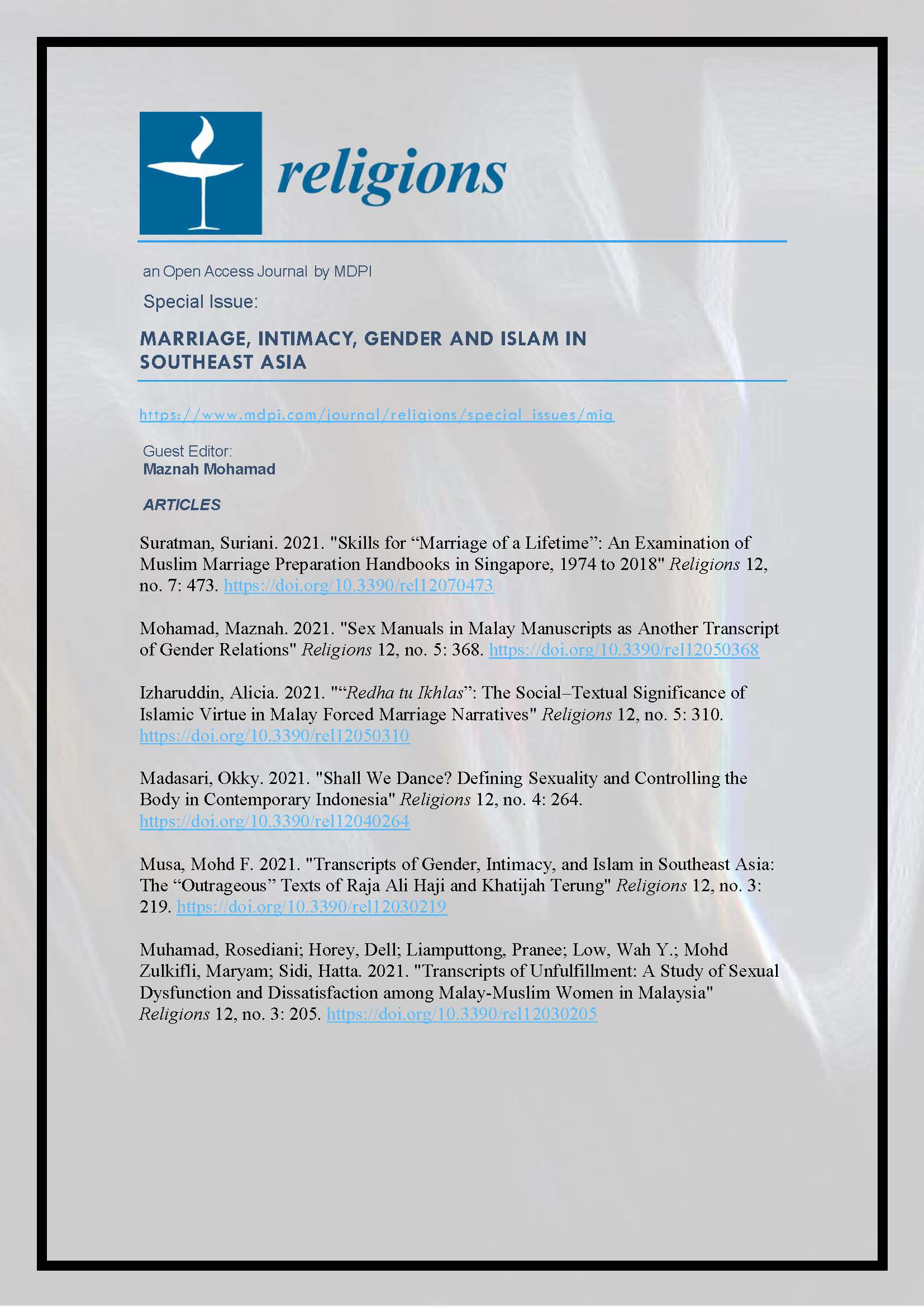Staff Publications
Staff Publications
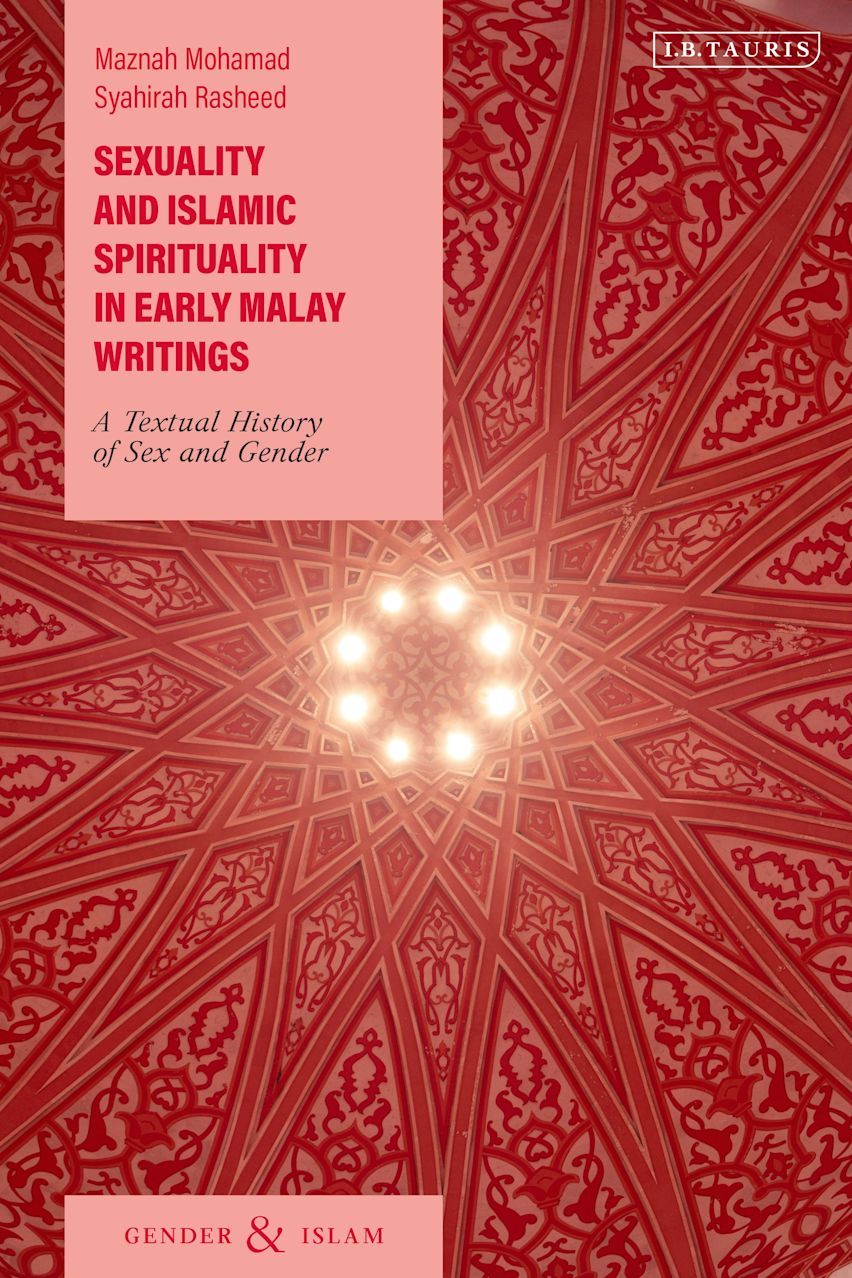
Sexuality and Islamic Spirituality in Early Malay Writings
Maznah Mohamad (Author), Syahirah Rasheed (Author) Bloomsbury Publishing, 2025
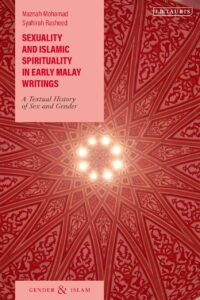
It is argued here that before the extensive formalization of sharia laws from the late nineteenth century onwards, Islam was prominently influenced by elements of enchantment and mysticism, mirrored in its textual portrayal of passionate and sexual relations.
This book's analysis is based on Malay manuscripts and texts about the body, sex, and sexuality. These include religious guidebooks on sexual techniques and etiquette, of which some are translated from the original Arabic or Persian, but almost all of which have been adapted for local Malay relevance. Also analyzed are collections of Malay erotic poetry from the sixteenth to nineteenth centuries and the only known female-authored early twentieth-century text on sex and women's sexual pleasure.
Over the centuries changing sexual norms and attitudes in the Malay world has disengaged sex and sexuality from being a crucial component of faith and spirituality-gradually receding into the discreet margins of contemporary discourse on gender relations.
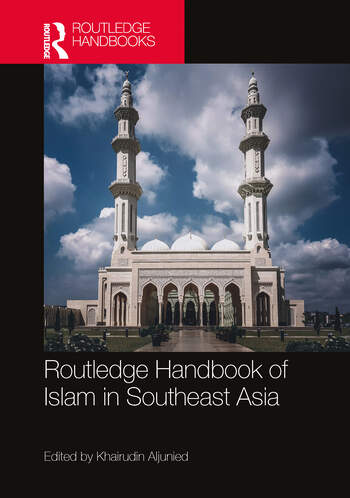
Shapers of Islam in Southeast Asia : Muslim Intellectuals and the Making of Islamic Reformism
Khairudin Aljunied, Routledge Handbook of Islam in Southeast Asia, Routledge, 2022
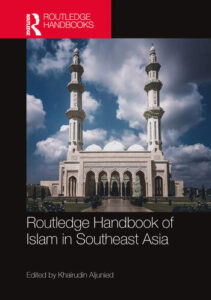
This handbook explores the ways in which Islam, as one of the fastest growing religions, has become a global faith for both Muslims and non-Muslims in Southeast Asia with its universality, inclusivity, and shared features with other Islamic expressions and manifestations. It offers an up-to-date, wide-ranging, comprehensive, concise, and readable introduction to the field of Islam in Southeast Asia.
With specific themes of pertinent contemporary relevance, the contributions by experts in the field provide fresh insights into the roles of states, societies, scholars, social movements, political parties, economic institutions, sacred sites, and other forces that structured the faith over many centuries. The handbook is structured in three parts:
- Muslim Global Circulations
- Marginal Narratives
- Refashioning Pieties
This handbook stands out as a single and synergistic reference work that explores the ebb and flow of Islam seeking to decenter many existing assumptions about it in Southeast Asia. It will be an indispensable resource for scholars, students, and policymakers working on Islam, Muslims, and their interactions with other communities in a plural setting.
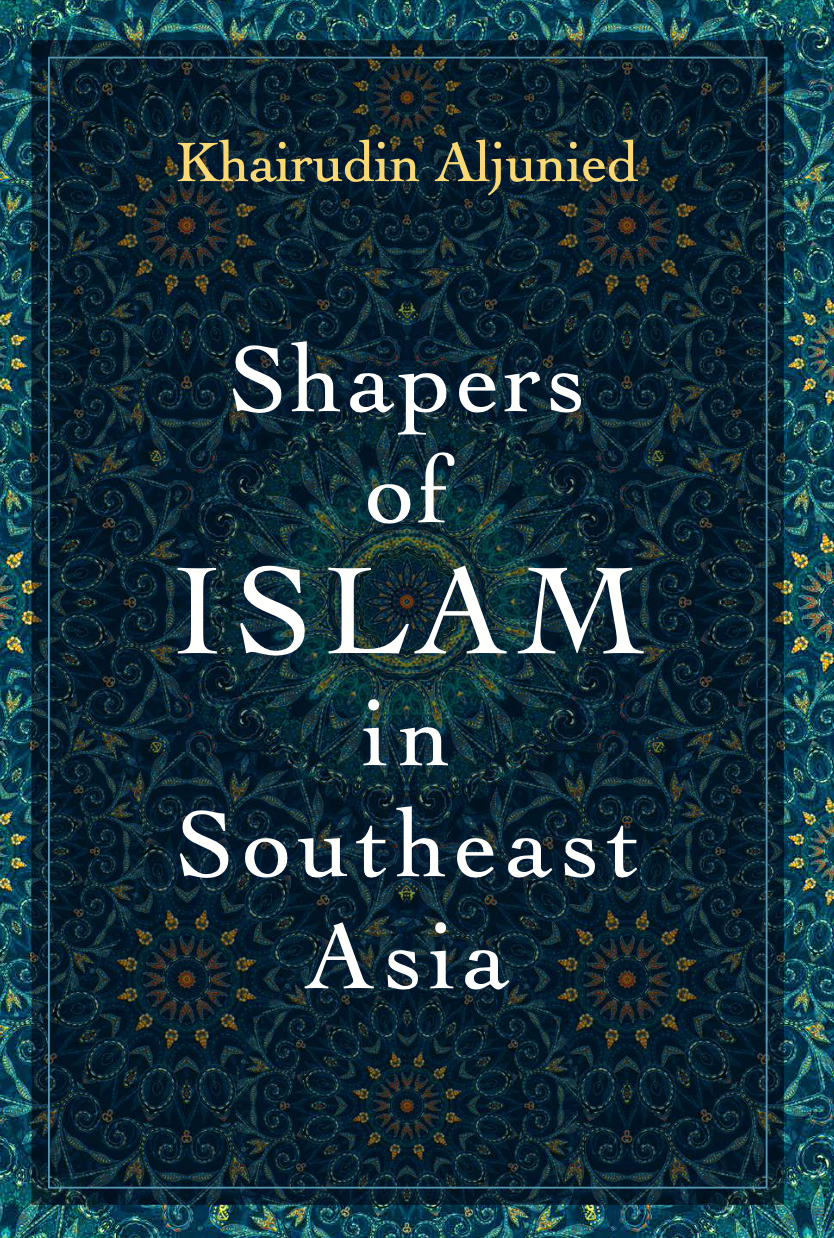
Shapers of Islam in Southeast Asia : Muslim Intellectuals and the Making of Islamic Reformism
Khairudin Aljunied, Shapers of Islam in Southeast Asia: Muslim Intellectuals and the Making of Islamic Reformism, Oxford University Press, 2023
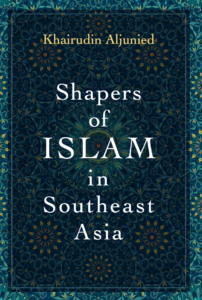
Southeast Asia is home to one of the largest Muslim populations in the world today. The region has also produced a cohort of reformers who have critiqued the limits of Islamic thought and propounded new lines of thinking with an eye toward constructing a better ummah.
Shapers of Islam in Southeast Asia captures the progressive and pluralistic nature of Islamic reform in Southeast Asia from the mid-twentieth century onward, a period that can now be regarded as the age of networked Islam. Offering a fresh conceptualization, the book shows how several influential Muslim intellectuals have given rise to an "Islamic reformist mosaic" in Southeast Asia. Representing different strands of reformist thinking, these shapers of Islam have constructed a unified and coherent frame of thought that distinguishes itself from the ultra-traditionalist and ultra-secularist leanings. This fascinating study is indispensable to anyone interested in understanding the challenges facing Islam and other religions in the modern world.
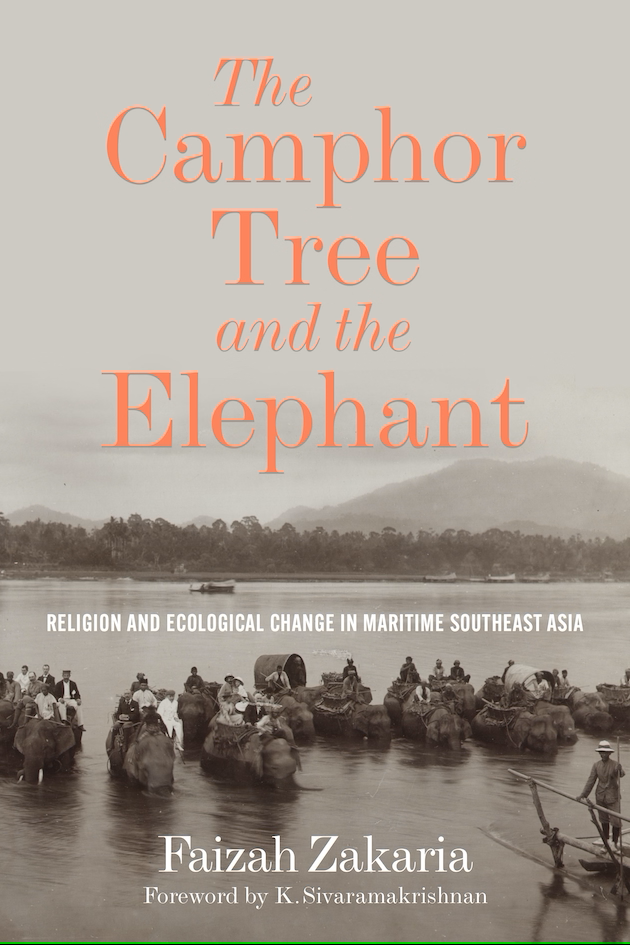
The Camphor Tree and the Elephant: Religion and Ecological Change in Maritime Southeast Asia
Faizah Zakaria, The Camphor Tree and the Elephant: Religion and Ecological Change in Maritime Southeast Asia, University of Washington Press, 2023
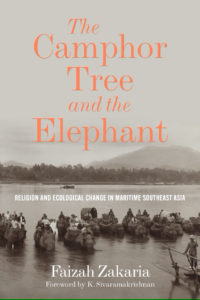
What is the role of religion in shaping interactions and relations between the human and nonhuman in nature? Why are Muslim and Christian organizations generally not a potent force in Southeast Asian environmental movements? The Camphor Tree and the Elephant brings these questions into the history of ecological change in the region, centering the roles of religion and colonialism in shaping the Anthropocene—“the human epoch.”
Historian Faizah Zakaria traces the conversion of the Batak people in upland Sumatra and the Malay Peninsula to Islam and Christianity during the long nineteenth century. She finds that the process helped shape social structures that voided the natural world of enchantment, ushered in a cash economy, and placed the power to remake local landscapes into the hands of a distant elite. Using a wide array of sources such as family histories, prayer manuscripts, and folktales in tandem with colonial and ethnographic archives, Zakaria brings everyday religion and its far-flung implications into our understanding of the environmental history of the modern world.
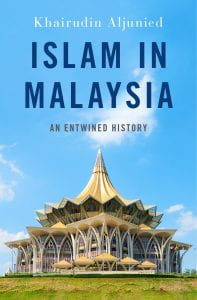
Islam in Malaysia : An Entwined History
Khairudin Aljunied, Islam in Malaysia: An Entwined History, UK: Oxford University Press, 2019
 This book surveys the growth and development of Islam in Malaysia from the eleventh to the twenty-first century, investigating how Islam has shaped the social lives, languages, cultures and politics of both Muslims and non-Muslims in one of the most populous Muslim regions in the world. Khairudin Aljunied shows how Muslims in Malaysia built upon the legacy of their pre-Islamic past while benefiting from Islamic ideas, values, and networks to found flourishing states and societies that have played an influential role in a globalizing world. He examines the movement of ideas, peoples, goods, technologies, arts, and cultures across into and out of Malaysia over the centuries.
This book surveys the growth and development of Islam in Malaysia from the eleventh to the twenty-first century, investigating how Islam has shaped the social lives, languages, cultures and politics of both Muslims and non-Muslims in one of the most populous Muslim regions in the world. Khairudin Aljunied shows how Muslims in Malaysia built upon the legacy of their pre-Islamic past while benefiting from Islamic ideas, values, and networks to found flourishing states and societies that have played an influential role in a globalizing world. He examines the movement of ideas, peoples, goods, technologies, arts, and cultures across into and out of Malaysia over the centuries.
Interactions between Muslims and the local Malay population began as early as the eighth century, sustained by trade and the agency of Sufi as well as Arab, Indian, Persian, and Chinese scholars and missionaries. Aljunied looks at how Malay states and societies survived under colonial regimes that heightened racial and religious divisions, and how Muslims responded through violence as well as reformist movements. Although there have been tensions and skirmishes between Muslims and non-Muslims in Malaysia, they have learned in the main to co-exist harmoniously, creating a society comprising of a variety of distinct populations. This is the first book to provide a seamless account of the millennium-old venture of Islam in Malaysia.
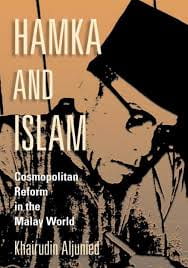
Hamka and Islam: Cosmopolitan Reform in the Malay World
Khairudin Aljunied, Hamka and Islam Cosmopolitan Reform in the Malay Word, Cornell University Press, 2018

Since the early twentieth century, Muslim reformers have been campaigning for a total transformation of the ways in which Islam is imagined in the Malay world. One of the most influential is the author Haji Abdul Malik bin Abdul Karim Amrullah, commonly known as Hamka. In Hamka and Islam, Khairudin Aljunied employs the term “cosmopolitan reform” to describe Hamka’s attempt to harmonize the many streams of Islamic and Western thought while posing solutions to the various challenges facing Muslims. Among the major themes Aljunied explores are reason and revelation, moderation and extremism, social justice, the state of women in society, and Sufism in the modern age, as well as the importance of history in reforming the minds of modern Muslims. Aljunied argues that Hamka demonstrated intellectual openness and inclusiveness toward a whole range of thoughts and philosophies to develop his own vocabulary of reform, attesting to Hamka’s unique ability to function as a conduit for competing Islamic and secular groups.
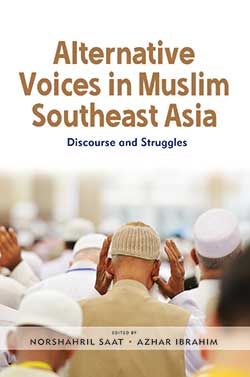
Alternative Voices in Muslim Southeast Asia: Discourses and Struggles
Azhar Ibrahim, Norshahril Saat (Editors), Alternative Voices in Muslim Southeast Asia: Discourses and Struggles, ISEAS – Yusof Ishak Institute, 2019
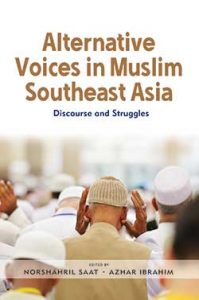 According to some observers, Southeast Asian Islam is undergoing a conservative turn. This means voices that champion humanist, progressive or moderate ideas are located on the fringes of society. Is this assessment accurate for a region that used to be known for promoting the “smiling face of Islam”? Alternative Voices in Muslim Southeast Asia examines the challenges facing progressive voices in Indonesia, Malaysia and Singapore today. It examines their discourses, which delve into how multiculturalism and secularism are the way forward for the diverse societies of these three countries. Moreover, it analyses the avenues employed by these voices in articulating their views amidst the dominance of state and quasi-state religious officials who seek to restrict and discipline them.
According to some observers, Southeast Asian Islam is undergoing a conservative turn. This means voices that champion humanist, progressive or moderate ideas are located on the fringes of society. Is this assessment accurate for a region that used to be known for promoting the “smiling face of Islam”? Alternative Voices in Muslim Southeast Asia examines the challenges facing progressive voices in Indonesia, Malaysia and Singapore today. It examines their discourses, which delve into how multiculturalism and secularism are the way forward for the diverse societies of these three countries. Moreover, it analyses the avenues employed by these voices in articulating their views amidst the dominance of state and quasi-state religious officials who seek to restrict and discipline them.
Contributors to the volume include scholars, activists and observers, some of whom are victims of repression and discrimination. While most of the chapters cover developments of the last decade, some of them go back to the previous century, capturing the emergence of modernist thinkers influenced by parallel movements in the Middle East and the wider region. Others respond to recent developments concerning Islam and Muslims in the three countries: the Pakatan Harapan coalition victory in the 2018 Malaysian election, the re-election of Joko Widodo as Indonesia’s president in 2019, and recent religious rulings passed in Singapore. Readers should come not only to reflect on the struggles faced by this group but also to appreciate the humanist traditions essential for the development of the societies of these countries in the midst of change.
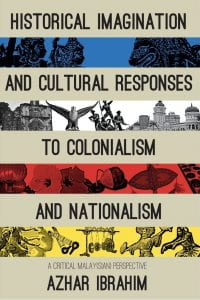
Historical Imagination and Cultural Responses to Colonialism and Nationalism: A Critical Malay(sian) Perspective
Azhar Ibrahim, Historical Imagination and Cultural Responses to Colonialism and Nationalism: A Critical Malay(sian) Perspective, Malaysia: Gb Gerakbudaya Enterprise Sdn Bhd, 2017

History conditions the way that society discusses its problems. Treating history as a form of ‘imagination’, Azhar Ibrahim invites readers to probe the colonialist and nationalist tampering, suppression, and distortion of narratives on the Malays. In this thought-provoking book, the author encourages contemporary historians to move beyond the practice of Orientalist scholars: collecting data and describing facts. Instead, he promotes an alternative reading of history, one that departs from mainstream versions. Reflecting a strong understanding of classical Malay texts, the author also touches on broad themes such as psychological feudalism, orientalism, and the contestation of nationalist and colonialist perspectives on the community. Azhar’s book is a welcomed contribution and a must-read for those interested in alternative discourses in Malay Studies.

Sovereign Women in a Muslim Kingdom: The Sultanahs of Aceh, 1641-1699
Sher Banu A.L. Khan, Sovereign Women in a Muslim Kingdom: The Sultanahs of Aceh, 1641-1699, Singapore: NUS Press, 2017

The Islamic kingdom of Aceh was ruled by queens for half of the 17th century. Was female rule an aberration? Unnatural? A violation of nature, comparable to hens instead of roosters crowing at dawn? Indigenous texts and European sources offer different evaluations. Drawing on both sets of sources, this book shows that female rule was legitimised both by Islam and adat (indigenous customary laws), and provides original insights on the Sultanah’s leadership, their relations with male elites, and their encounters with European envoys who visited their court. The book challenges received views on kingship in the Malay world and the response of indigenous polities to east-west encounters in Southeast Asia’s Age of Commerce.
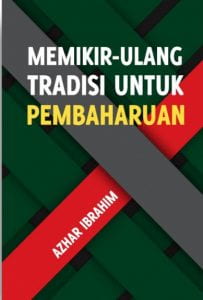
Memikir-Ulang Tradisi untuk Pembaharuan
Azhar Ibrahim, Memikir-ulang Tradisi untuk Pembaharuan, Strategic Information and Research Development Centre, 2019

Buku ini melewati semula agenda pembaharuan dengan menelesuri tradisi yang tercerah, yang tersudut dalam sejarah serta harus dapat dikembalikan peranannya tanpa pula kita terjebak meromantiskannya, yang mengidamkan pulang ke tradisi semata-mata sebagai jalan keluar dari segala kemelut dan permasalahan yang kita hadapi. Pembaharuan akan bisa berakar sekiranya tampil di kalangan agamawan dan aktivis-santri yang bukan sahaja teryakin dari gagasan reformis, tetapi juga datang dari sekelompok tradisionalis yang tercerah.
Yang terakhir ini dapat membedakan peranan tradisi yang dinamis sifatnya, sebagai gerak nilai dan budaya yang mampu menawarkan nilai-nilai ulung dan universal sepanjang perjalanan sejarah, tanpa terikat dengan pola pemikiran sesuatu zaman. Yang paling jelas, pembaharuan tradisi agama akan terbantut selagi agama tidak bergerak dalam ranah yang bebas, yakni dibelenggu dengan hegemoni konservatisme yang pantang mendengar ungkapan baru yang tidak selari dengan ideologi mereka, ataupun wacana itu sendiri senang dikotak-katikkan oleh pihak berwewenang, yang lebih cenderung untuk memaksakan fahaman dominan ke atas semua, atas nama mengekalkan kemurniaan dan kepersatuan agama dan jemaahnya.
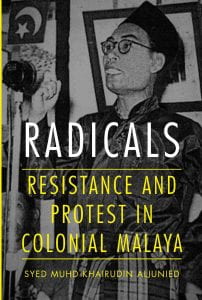
Radicals: Resistance and Protest in Colonial Malaya
Syed Muhd Khairudin Aljunied, Radicals: Resistance and Protest in Colonial Malaya, Northern Illinois University Press, 2015
 Radicals tells the story of a group of radical Malay men and women from ordinary social backgrounds who chose to oppose foreign rule of their homeland, knowing full well that by embarking on this path of resistance, they would risk imprisonment or death. Their ranks included teachers, journalists, intellectuals, housewives, peasants, preachers, and youths. They formed, led, and contributed to the founding of political parties, grassroots organizations, unions, newspapers, periodicals, and schools that spread their ideas across the country in the aftermath of the Great Depression, when colonialism was at its height and evident in all areas of life in their country. But when their efforts to uproot foreign dominance faltered in the face of the sanctions the state imposed upon them, some of these radicals chose to take up arms, while others engaged in aggressive protests and acts of civil disobedience to uphold their rights. While some died fighting and hundreds were incarcerated, many lived to resist colonialism until their country attained its independence in August 1957, all of these Malay radicals were devoted to becoming free men and women and to claiming their right to be treated as equals in a world riddled with prejudice and contradictions.
Radicals tells the story of a group of radical Malay men and women from ordinary social backgrounds who chose to oppose foreign rule of their homeland, knowing full well that by embarking on this path of resistance, they would risk imprisonment or death. Their ranks included teachers, journalists, intellectuals, housewives, peasants, preachers, and youths. They formed, led, and contributed to the founding of political parties, grassroots organizations, unions, newspapers, periodicals, and schools that spread their ideas across the country in the aftermath of the Great Depression, when colonialism was at its height and evident in all areas of life in their country. But when their efforts to uproot foreign dominance faltered in the face of the sanctions the state imposed upon them, some of these radicals chose to take up arms, while others engaged in aggressive protests and acts of civil disobedience to uphold their rights. While some died fighting and hundreds were incarcerated, many lived to resist colonialism until their country attained its independence in August 1957, all of these Malay radicals were devoted to becoming free men and women and to claiming their right to be treated as equals in a world riddled with prejudice and contradictions.
Syed Muhd Khairudin Aljunied’s innovative study brings to light the less charted and unanalyzed terrain of the radical experience—becoming and being radical. He argues that the experiences and histories of radicals in colonial Malaya can be elucidated in a more nuanced way by interrogating them alongside evolving local and global circumstances and by analyzing them through the lenses of a set of overarching and interconnected mobilizing concepts—a set of ideas, visions, and notions that the radicals used to reason and justify their advent—that were internalized, lived, and utilized in the course of their activism. These mobilizing concepts were their weapons and armor, employed to organize, strategize, protect, and consolidate themselves when menaced by the tentacles of the colonial state as they embarked upon the agonizing path towards independence. Those interested in Malaysian history, colonial history, radical movements, and resistance groups will enjoy this fascinating study.
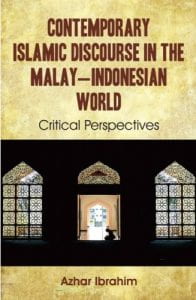
Contemporary Islamic Discourse in the Malay-Indonesian World: Critical Perspectives
Azhar Ibrahim, Contemporary Islamic Discourse in the Malay-Indonesian World: Critical Perspectives, Malaysia: Strategic Information and Research Development Centre (SIRD), 2014
 While many books have probed the role of Islam in political and social change in Southeast Asia over the past three decades, few have focused on the power of the religious discourse itself in shaping this transformation. Contemporary Islamic Discourse in the Malay–Indonesian World captures the interplay between religion and social thought in comparative case studies from Malaysia, Indonesia and Singapore. Drawing on a critical sociology of knowledge and a profound understanding of historical contexts, the central focus is on Muslim intellectuals who have grappled with the impact of modernity in these societies, between those seeking to reform Islam’s role and those who take a hardline defensive stance. The discussion deals successively with the role of religious traditionalism, the upsurge of dakwah revivalism and the public sphere, attitudes towards democracy and pluralism, and finally the ideas advanced by liberal Islam and its opponents. Above all, Azhar Ibrahim offers the reader a creative way of understanding the modern Islamic discourse and its relationship to the remaking of society at large.
While many books have probed the role of Islam in political and social change in Southeast Asia over the past three decades, few have focused on the power of the religious discourse itself in shaping this transformation. Contemporary Islamic Discourse in the Malay–Indonesian World captures the interplay between religion and social thought in comparative case studies from Malaysia, Indonesia and Singapore. Drawing on a critical sociology of knowledge and a profound understanding of historical contexts, the central focus is on Muslim intellectuals who have grappled with the impact of modernity in these societies, between those seeking to reform Islam’s role and those who take a hardline defensive stance. The discussion deals successively with the role of religious traditionalism, the upsurge of dakwah revivalism and the public sphere, attitudes towards democracy and pluralism, and finally the ideas advanced by liberal Islam and its opponents. Above all, Azhar Ibrahim offers the reader a creative way of understanding the modern Islamic discourse and its relationship to the remaking of society at large.
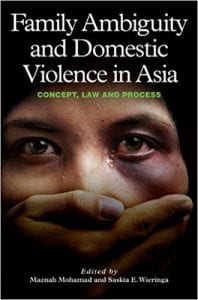
Family Ambiguity and Domestic Violence in Asia: Concept, Law and Strategy
Maznah Mohamad and Saskia E. Wieringa (eds.), Family Ambiguity and Domestic Violence in Asia: Concept, Law and Strategy, UK: Sussex Academic Press, 2013
 Domestic violence in Asia is explored in this analysis through questions of family ambiguity and the relationship between concept, law, and strategy. Comparative experiences in the Asian context enable an examination of the effectiveness of family regulations and laws in diverse national, cultural, and religious settings. Key questions relate to the limits and relevance of the human rights discourse in resolving family conflicts; the extent to which power and control in intimate relationships can actually be regulated by a set of inanimate, homogeneous, and uniform policies and legislations; and how the state relates to the family as an ambiguous unit given state rules of governance that perpetuate unequal gender relations. Carefully considering the many components of domestic violence—such as state intervention versus the private domain and differences in legislation across Asia—the book offers new theoretical insights to the conceptualization of the family, culture, and law, and provides reasoned new perspectives on the effectiveness or inadequacy of present policies and enforcement strategies against domestic violence in Asia.
Domestic violence in Asia is explored in this analysis through questions of family ambiguity and the relationship between concept, law, and strategy. Comparative experiences in the Asian context enable an examination of the effectiveness of family regulations and laws in diverse national, cultural, and religious settings. Key questions relate to the limits and relevance of the human rights discourse in resolving family conflicts; the extent to which power and control in intimate relationships can actually be regulated by a set of inanimate, homogeneous, and uniform policies and legislations; and how the state relates to the family as an ambiguous unit given state rules of governance that perpetuate unequal gender relations. Carefully considering the many components of domestic violence—such as state intervention versus the private domain and differences in legislation across Asia—the book offers new theoretical insights to the conceptualization of the family, culture, and law, and provides reasoned new perspectives on the effectiveness or inadequacy of present policies and enforcement strategies against domestic violence in Asia.
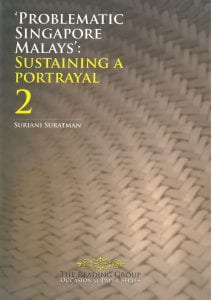
Problematic Singapore Malays: Sustaining a Portrayal
Suriani Suratman, Problematic Singapore Malays : Sustaining a Portrayal, Singapore : Leftwrite Center in collaboration with the Reading Group Singapore, 2010
 This monograph is about the portrayal of the Malays by the government, as found in the mainstream media. The dominant feature of this portrayal is what the author describes as the ‘problematic Singapore Malays’. Two main characteristics emerged: that the Malays are “lagging behind” despite visible progress, and portrayal of their “doubtful loyalty”. Through a survey of newspaper reports from the period of the 1960s to the 1990s, this paper argues that the sustained reproduction of ‘the problematic Malays’ occurs through (1) continuous identifying of new areas requiring attention, and (2) making comparisons of progress between ethnic groups at a given point of time instead of looking at longitudinal progress. Overall, it is a clear indication of the consistent gazing upon the Malays.
This monograph is about the portrayal of the Malays by the government, as found in the mainstream media. The dominant feature of this portrayal is what the author describes as the ‘problematic Singapore Malays’. Two main characteristics emerged: that the Malays are “lagging behind” despite visible progress, and portrayal of their “doubtful loyalty”. Through a survey of newspaper reports from the period of the 1960s to the 1990s, this paper argues that the sustained reproduction of ‘the problematic Malays’ occurs through (1) continuous identifying of new areas requiring attention, and (2) making comparisons of progress between ethnic groups at a given point of time instead of looking at longitudinal progress. Overall, it is a clear indication of the consistent gazing upon the Malays.
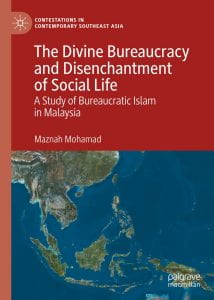
The Divine Bureaucracy and Disenchantment of Social Life: A Study of Bureaucratic Islam in Malaysia
Maznah Mohamad, The Divine Bureaucracy and Disenchantment of Social Life: A Study of Bureaucratic Islam in Malaysia, Palgrave Macmillan, 2020

This book traces the expansion of Islamisation within a modern and plural state such as Malaysia. It elaborates on how elements of theology, sacred space, resources, and their interactivity with secular instruments such as legislative, electoral, and new social technological platforms are all instrumentally employed to consolidate a divine bureaucracy. The book makes the point that religious social movements and political parties are only few of the important agents of Islamisation in society. The other is the modern and secular state structure itself. Weber’s legal rational bureaucracy or Hegel’s ethical bureaucracy predominantly characterises a modern feature of governmentality. In this instance an Islamic bureaucracy is advantageously situated not only within an ambit of modernity and therefore legality, but divinity and therefore sacrality as well. This positioning gives religious state agents more salience than any other form of bureaucracy leading to their unquestioned authority in the current contexts of societies with Muslim majority rule. One of the requisites of this condition is the homogenisation of Islam followed by ring-fencing of its constituents. The latter can involve contestations with women, other genders, ‘secular’ Muslims, non-Muslims as well as dissenting Muslims with their differing truthful ‘Islams’.
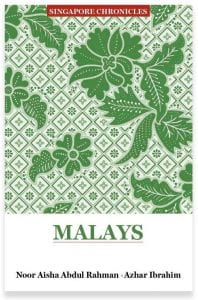
Singapore Chronicles: Malays
Noor Aisha Abdul Rahman & Azhar Ibrahim, Singapore Chronicles: Malays, Straits Times Press, 2017
 This work offers a glimpse of the Malay community as it adapted to its minority status and responded to the myriad challenges of historical, social and political changes. Unlike among the Chinese and the Indians, there is remarkable cohesiveness within the community as most speak Malay and practise Islam. Yet, like the other communities, it struggles to retain its culture, tradition and values against the onslaught of urbanisation and Westernisation. With a focus on Malay leadership, education, religion, Syariah laws, language and literary tradition, this book evaluates how these aspects have evolved over the decades. Problems pertaining to the community’s socio-economic progress and future challenges are also discussed. This primer is an introduction to one of Singapore’s small yet resilient and remarkable communities.
This work offers a glimpse of the Malay community as it adapted to its minority status and responded to the myriad challenges of historical, social and political changes. Unlike among the Chinese and the Indians, there is remarkable cohesiveness within the community as most speak Malay and practise Islam. Yet, like the other communities, it struggles to retain its culture, tradition and values against the onslaught of urbanisation and Westernisation. With a focus on Malay leadership, education, religion, Syariah laws, language and literary tradition, this book evaluates how these aspects have evolved over the decades. Problems pertaining to the community’s socio-economic progress and future challenges are also discussed. This primer is an introduction to one of Singapore’s small yet resilient and remarkable communities.
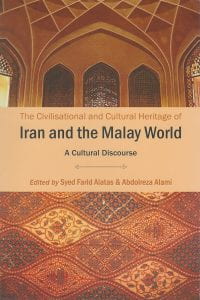
The Civilisational and Cultural Heritage of Iran and the Malay World: A Cultural Discourse
Syed Farid Alatas and Abdolreza Alami (eds.), The Civilisational and Cultural Heritage of Iran and the Malay World: A Cultural Discourse, Malaysia: Gerakbudaya, 2018
 The development of Islamic civilisation in the various regions of the world was, and is, a complex process which has attracted the attention of many researchers. The Muslim world can be compared to an Iranian carpet which, with its diversity of colours, geometrical patterns and floral designs, symbolises its very unity in diversity.
The development of Islamic civilisation in the various regions of the world was, and is, a complex process which has attracted the attention of many researchers. The Muslim world can be compared to an Iranian carpet which, with its diversity of colours, geometrical patterns and floral designs, symbolises its very unity in diversity.
The Muslim world has a mesmerising diversity of cultures, languages, ethnicities, and religious sects, and yet cannot be looked upon except through the lens of unity, a principle which lies at the heart of the Islamic religion. This is true despite the sectarianism that afflicts Muslims today.
The chapters which make up this volume were originally presented at the ‘International Conference on the Civilisational and Cultural Heritage of Iran and the Malay World: A Cultural Discourse’, jointly organised by the Cultural Centre of the Islamic Republic of Iran in Malaysia, the Asia West East Centre (Asia WE), the Faculty of Arts and Social Sciences, University of Malaya, the Department of Malay Studies, National University of Singapore, and the University of Nottingham Teaching Centre.
They aim to chronicle this unity in diversity of the Islamic world with a focus on the historical relations and interactions between the Persian and Malay world, Persian linguistic influence on the Malay language, the impact of Persian music in the Malay world, Sufi connections between the Iranian and Malay worlds, the Persian roots of classical Malay political thought, representations of Iran in Malaysia, and the importance of cultural dialogue between the Persian and Malay worlds.


